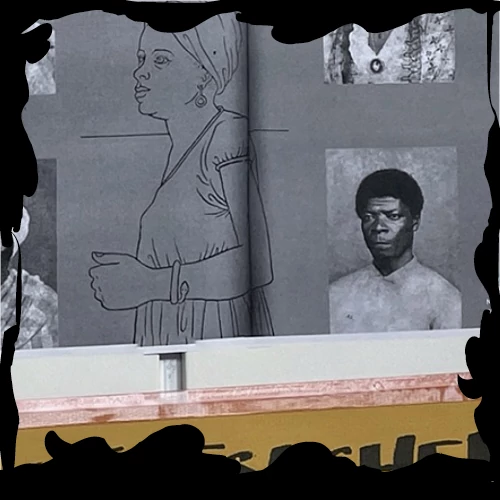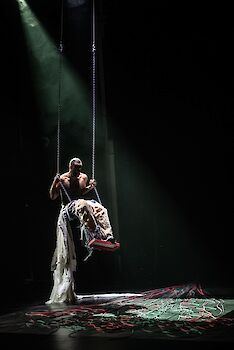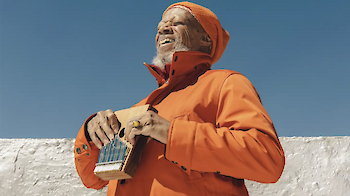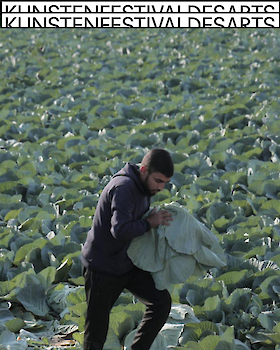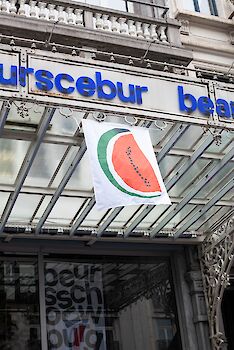During this workshop, director Rodrigo Batista and performer Carolina Maciel de França plan to zoom out of the performance and analyze the patriarchal concept of The Hero’s Journey by Joseph Campbell and the journey that presents itself when one wishes to apply this title to non-male, non-white and non-western bodies. Is that possible?
In English
It would be good to see the performance on 20 or 21 October before you come to the workshop.
In the performance The Hero’s Journey of Anastácia, performer Carolina Maciel de França starts researching a mythical figure who became an icon, heroine, and saint to thousands of Brazilians. Having seen Anastácia in her youth in a telenovela, Carolina was very surprised to discover that this was but one of the many versions existing of the life of the enslaved heroine and that she was not even a hero in all of them. Carolina then chooses to accept the dark side and dives deep into a realm of interests, contradictions, and even political strategies involving Anastácia – curating an autopsy of a small yet significant amount of them.
During this workshop, director Rodrigo Batista and performer Carolina Maciel de França plan to zoom out of the performance and analyze the patriarchal concept of The Hero’s Journey by Joseph Campbell and the journey that presents itself when one wishes to apply this title to non-male, non-white and non-western bodies. Is that possible?
After installing The Journey as designed by Campbell, Rodrigo and Carolina will invite you into the dark sides of the Hero’s Journey as well, to put the concept of the hero on their discursive analysis surgery table with us. Can we think of a desired future morality? What role will heroism play in it?
You can bring a hero, a heroine and a herothem if you like. (But under no circumstances will we allow heroin, the drug.)
Carolina Maciel de França (1986) is an author, consultant, moderator and maker. She was born in Pernambuco (Brazil), lived in the Netherlands and graduated in Antwerp as a literary translator. Through the intercultural organisation Kif Kif she ended up in the Flemish theatre world. In 2019 she graduated from the cultural leadership programme LinC Lage Landen and started her own multidisciplinary art practice. She wrote several essays (for Etcetera, rekto:verso, Brainwash and Ecopolis, among others), was moderator for dozens of on- and offline conversations and still likes to experiment with writing forms. Since 2020 Carolina has also been a guest lecturer at KASK drama.
Rodrigo Batista is a Brazilian theater maker and educator based in Gent/BE and
Amsterdam/NL. He graduated at DAS Theater Amsterdam in 2019, after finishing his Bachelor (2009) and his first Master Degree (2015) as a Theater Director in the University of São Paulo in Brazil. Since 2007, Batista develops aesthetics from macro-political themes, having researched in his trajectory in São Paulo notions from Biopolitics, relations between Art and Power, Tragedy, Opera procedures, Latin-American economy of debts, language, disappearance and strike. Since he arrived in Europe in 2017, the artist has developed a series of works that investigated Insurrection, straightforward political language, explicitness, poverty pornography, Capitalism in its gore phase, Brazilian Necropolitics, anti-colonialism as a dispute of territory, and lately, the operations and consequences behind the North-American Alt-Right Movement and its speculative connections with Greek Tragedy. His ambition has been to create theater performances that function as unapologetic aesthetic statements addressed to geopolitical contexts, through intense body research made from impulses of iconoclasm, humor, indigestion, mutilation, blood, and sex. Batista is an artist supported by Campo in Gent/BE and by Rotterdam Theater in The Netherlands. As an educator he worked in several social and artistic Programs in São Paulo (2009-2016) and as a guest teacher at KASK in Gent, Das Theater Amsterdam, and Drama Conservatorium in Antwerp.
